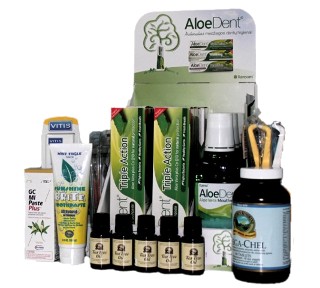Preventive Measures
Prevention of oral diseases is among the major activity areas of our Clinic. Prevention of oral diseases is a set of measures taken both in the Clinic and, what is particularly important, at home. Oral hygiene at home should be simple, fast and effective to the maximum extent. It should not become a torturing routine requiring much thinking and tempting to be avoided. Pharmacies and shopping malls sell a huge variety of products. Therefore, we have selected the ones which in our opinion are most suitable. The most important selection criteria are the following: effectiveness proven by science and sound naturalness.
Naturalness must be sound in order not to become the victims of green, organic, spreading a lot of good ideas yet commerce. For instance, what toothpaste to opt for: fluorine or fluorine free? “Green” sellers would say that fluorine is a strong toxic substance. It is a very active element in the halogen group suppressing the enzyme system of the body, affecting bones, sometimes even teeth, etc. On the basis of this statement, fluorine-free toothpastes are offered to everyone with no exceptions without taking into account the condition of the mouth of a specific person. Such behaviour may be applied an old Lithuanian saying: “they heard the bells chiming but do not know in which church”. Fluorine is in fact a strong toxic substance but only when a large amount of it is eaten. Whereas, when used in the mouth for three minutes as long as teeth are cleaned, it will not cause any toxic response. Fluorine attaches to dental tissue and makes it much more resistant to decay. It was proven by a great deal of scientific research long ago. Whereas when cleaning teeth only with fluorine-free toothpastes, the activity of decay in the mouth is not reduced. Fluorine-free toothpastes clean teeth but do not provide them with increased resistance to withstand contemporary eating habits (see Prevention of Oral Diseases). We constantly snack at food rich in carbohydrates. In order not to leave space for groundless speculations, it is noteworthy that this data has been provided by of independent experts. Thus, fluorine should be treated as an effective medicine for decay for local rather than general use. As all medicines, it should help the body with a weak genetically determined link which the body cannot manage by itself. As a medicine, it should be used properly. It is important that fluorine levels in drinking water are not too high. People having no dental lesions or wearing dentures secured on implants do not need fluorine toothpastes. Children’s teeth should be cleaned with fluorine-free paste until children learn not to swallow it and spit it out. Taking into account the possibility of accidental swallowing, fluorine concentration in toothpastes depends on children’s age.
Naturalness must be sound in order not to become the victims of green, organic, spreading a lot of good ideas yet commerce. For instance, what toothpaste to opt for: fluorine or fluorine free? “Green” sellers would say that fluorine is a strong toxic substance. It is a very active element in the halogen group suppressing the enzyme system of the body, affecting bones, sometimes even teeth, etc. On the basis of this statement, fluorine-free toothpastes are offered to everyone with no exceptions without taking into account the condition of the mouth of a specific person. Such behaviour may be applied an old Lithuanian saying: “they heard the bells chiming but do not know in which church”. Fluorine is in fact a strong toxic substance but only when a large amount of it is eaten. Whereas, when used in the mouth for three minutes as long as teeth are cleaned, it will not cause any toxic response. Fluorine attaches to dental tissue and makes it much more resistant to decay. It was proven by a great deal of scientific research long ago. Whereas when cleaning teeth only with fluorine-free toothpastes, the activity of decay in the mouth is not reduced. Fluorine-free toothpastes clean teeth but do not provide them with increased resistance to withstand contemporary eating habits (see Prevention of Oral Diseases). We constantly snack at food rich in carbohydrates. In order not to leave space for groundless speculations, it is noteworthy that this data has been provided by of independent experts. Thus, fluorine should be treated as an effective medicine for decay for local rather than general use. As all medicines, it should help the body with a weak genetically determined link which the body cannot manage by itself. As a medicine, it should be used properly. It is important that fluorine levels in drinking water are not too high. People having no dental lesions or wearing dentures secured on implants do not need fluorine toothpastes. Children’s teeth should be cleaned with fluorine-free paste until children learn not to swallow it and spit it out. Taking into account the possibility of accidental swallowing, fluorine concentration in toothpastes depends on children’s age.
Other ingredients of toothpastes are also important: they should not contain sodium laurel sulphate which irritates mucosa, parabens. When the pathology of periodontium is diagnosed, various toothpastes containing medicinal plants are recommended (for example, containing tea tree, aloe vera). Thus, when selecting oral hygiene products, professionals’ opinion should be heard as well so as to find the most cost-effective solution upon examination of individual oral condition.



